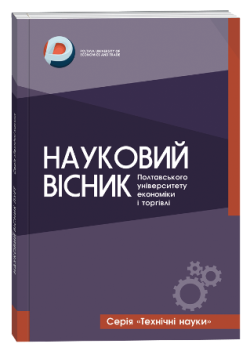SOFTWARE ANALYSIS OF THE ENVIRONMENTAL FRIENDLINESS ASSESSMENT OF THE ENVIRONMENTAL OBJECTS
Abstract
The increase of ecofriendlyness and safety of technologies and estimation of their influence on a natural environment are based on many principles: study of technological processes and exposure of sources of formation of harmful substances. On the quantitative estimation of receipt of contaminents in the environment, normative requirements, sanitary-hygienic descriptions; feasibility study, technological regulations, maximum possible level of physical influences, on the classes of wastes danger. Maximum possible concentration of harmful substances in the air, water objects; methodologies, estimations of influence at the environment, project and operating data; on the complex estimation of ecofriendlyness of technologies. The actual research and practice task of ecological estimation is development of the informatively-algorithmic providing of evaluation of ecofriendlyness and unconcern of industrial objects on the basis of improvement of theoretical, methodical positions of complex ecological analysis. Thus, the development of methodological support for solving the problem of assessing the environmental friendliness of enterprises is relevant for the Environmental Quality Management of the environment, aimed at improving the information and algorithmic component of studying the level of environmental safety of system objects. Modern information systems for assessing the safety of natural and manmade objects are based on methods of risk analysis, product life cycle analysis, and forecasting the consequences of negative impacts on environmental components and public health. All the software tools discussed in the article are used for closed-cycle economics, life cycle assessment, building certification, sustainable design, ErP and environmental design directives, environmental product declarations, environmental information technologies, product carbon footprint, environmental footprint, product impact on the environment, resource and energy efficiency and water footprint.
References
2. Bovea M.D., Ibáñez-Forés V., Gallardo A., ColomerMendoza F.J. Environmental assessment of alternative municipal solid waste management strategies. A Spanish case study. Waste Management, 2010, vol. 30, no. 11, pp. 2383–2395
3. Chen X. Life Cycle Assessment (LCA) of Five Municipal Solid Waste Management Systems (MSWMS): A Case Study of Nanjing, China : Thesis of Master of Science. University of East Anglia, Norwich Research Park. UK, 2012, 48 p. URL: https://pdfs.semanticscholar.org/ff80/a0fd04868b9cdcadcac48bcc31fcb6fd3951.pdf
4. Cremiato R., Mastellone M.L., Tagliaferri C., Zaccariello L., Lettieri P. Environmental impact of municipal solid waste management using Life Cycle Assessment: The effect of anaerobic digestion, materials recovery and secondary fuels production. Renewable Energy, 2018, vol. 124, pp. 180–188.
5. Liikanen M., Havukainen J., Viana E., Horttanainen M. Steps towards more environmentally sustainable municipal solid waste management – A life cycle assessment study of Sao Paulo, Brazil. Journal of Cleaner Production, 2018, vol. 196, pp. 150–162.
6. Ogundipe F.O., Jimoh O.D. Life Cycle Assessment of Municipal Solid Waste Management in Minna, Niger State, Nigeria. International Journal of Environmental Research, 2015, vol. 9, no. 4, pp. 1305–1314.
7. Parkes O., Lettieri P., Bogle I.D.L. Life cycle assessment of integrated waste management systems for alternative legacy scenarios of the London Olympic Park. Waste Management, 2015, vol. 40, pp. 157–166.
8. Ripa M., Fiorentino G., Vacca V., Ulgiati S. The relevance of site-specific data in Life Cycle Assessment (LCA). The case of the municipal solid waste management in the metropolitan city of Naples (Italy). Journal of Cleaner Production, 2017, vol. 142, Part 1, pp. 445–460.
9. Ripaldi G. Life Cycle Assessment of Waste Management System. The case of Avezzano, Italy: Master of Science Thesis. Stockholm, 2015, 124 p. URL: https://upcommons.upc.edu/bitstream/handle/2117/79534/GloriaRipaldiFialDraft.pdf?sequence=1&isAllowed=y
10. Yay A.S.E. Application of life cycle assessment (LCA) for municipal solid waste management: a case study of Sakarya. Journal of Cleaner Production, 2015, vol. 94, pp. 284–293.


